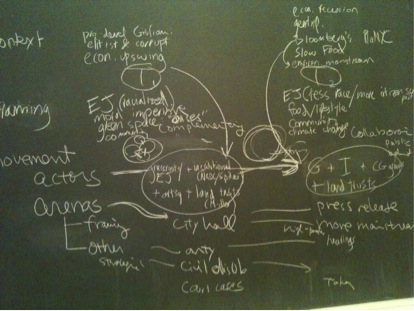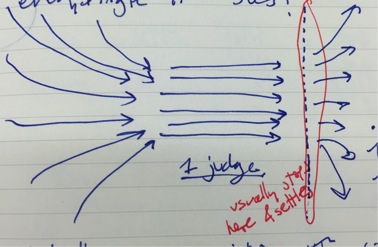CREATIVE AUTOBIOGRAPHY-- By LaurenPackard - 31 May 2015 Growing up, my neighbor was an art teacher who taught out of her home. Her house was teaming with colors and textures and there was a vegetable garden with strawberries out front and a patio with a pond and a kiln out back. There was a freezer full of ice cream sandwiches and you could eat one if you sewed through your finger or cut yourself with a band saw or burned yourself with the metal styluses you could heat up and press into wood to make designs. I was her favorite. I would stay after hours and I would walk over early on the weekends. Sometimes she took me to buy art supplies. Once she took me on a long drive up through the redwoods to a blackware firing, where potters cooked off their pieces in a bonfire. We moved away when I was 9, but those experiences stayed with me. I wrote about her on my college application essay—a circle-of-life-and-creativity musing in which I superimposed my own experiences as a painting instructor at a summer camp over the memories of her mentorship. In college, I majored in social theory instead of studio art, as I had intended. I found a mentor who fostered my creative growth in that field. When she advised my senior thesis, we blocked off hours for brainstorming in an empty classroom. After an hour the chalkboard would look like this: The result was a novel and richly complicated investigation into the dialectic between meaning-appropriation and meaning-making in the social activism to save New York City's community gardens from development.
I started studying for the LSAT a year or two after I graduated, doing practice problems before work and on the weekends. I stopped making art.
I got into law school and quit my job but still felt stuck.
Searching for a creative palette-cleanser, I signed up for a shamanic painting workshop in Big Sur. For eight hours a day for five days I painted in a single-room yurt along with a handful of middle-aged women, in complete anonymity and lost in myself.
The experience was process-oriented, not product-oriented. I worked and reworked the same piece of paper all week long—it morphed from a post-Impressionist landscape to a star-scape to a flying aboriginal snake. There were no corners or sharp edges in the yurt—energy festered, gathering in the middle and driving us wilder every day. Midweek, we each performed an interpretive dance of our painting. I barely remember mine but I know at some point I pounded on the ground because my hands were raw afterwards.
It was weird. But it worked. My inner world felt expansive again.
But the first semester of law school imposed strict parameters on my time and on my thoughts. A diagram of multi-district litigation my Torts professor drew on the board is an appropriate analogue:
The result was a novel and richly complicated investigation into the dialectic between meaning-appropriation and meaning-making in the social activism to save New York City's community gardens from development.
I started studying for the LSAT a year or two after I graduated, doing practice problems before work and on the weekends. I stopped making art.
I got into law school and quit my job but still felt stuck.
Searching for a creative palette-cleanser, I signed up for a shamanic painting workshop in Big Sur. For eight hours a day for five days I painted in a single-room yurt along with a handful of middle-aged women, in complete anonymity and lost in myself.
The experience was process-oriented, not product-oriented. I worked and reworked the same piece of paper all week long—it morphed from a post-Impressionist landscape to a star-scape to a flying aboriginal snake. There were no corners or sharp edges in the yurt—energy festered, gathering in the middle and driving us wilder every day. Midweek, we each performed an interpretive dance of our painting. I barely remember mine but I know at some point I pounded on the ground because my hands were raw afterwards.
It was weird. But it worked. My inner world felt expansive again.
But the first semester of law school imposed strict parameters on my time and on my thoughts. A diagram of multi-district litigation my Torts professor drew on the board is an appropriate analogue:
 I took this class because the course description mentioned creativity, and I was starving for it.
The first year of law school sublimated two facets of the human experience fundamental to creative thinking: spaciousness and diversity of experience.
Spaciousness refers to the mental and physical space necessary to create and create and create with only the expectation that some things are not worth holding onto. It means unencumbered time to reflect and synthesize and let the unconscious do its thing.
Diversity of experience refers to the bank of reference points, ideas, frames, and textures we accumulate and can consequently weave together in new and unexpected ways.
Could law school accommodate creativity? The 1L curriculum is hostile towards unstructured time and open space and marched along this past year with crushing monotony. But during second semester I was disciplined enough with my time so that I had a few hours each week to make stuff, including this collage inspired by exams that I posted a while back:
I took this class because the course description mentioned creativity, and I was starving for it.
The first year of law school sublimated two facets of the human experience fundamental to creative thinking: spaciousness and diversity of experience.
Spaciousness refers to the mental and physical space necessary to create and create and create with only the expectation that some things are not worth holding onto. It means unencumbered time to reflect and synthesize and let the unconscious do its thing.
Diversity of experience refers to the bank of reference points, ideas, frames, and textures we accumulate and can consequently weave together in new and unexpected ways.
Could law school accommodate creativity? The 1L curriculum is hostile towards unstructured time and open space and marched along this past year with crushing monotony. But during second semester I was disciplined enough with my time so that I had a few hours each week to make stuff, including this collage inspired by exams that I posted a while back:
Good. That there is a schedule, that this form of art is tied to time, as music is, will be constantly apparent, so we needn't make it more so. Really good lawyers are people always arriving just in time. You'll make that work for you, too. You are entitled to restrict access to your paper if you want to. But we all derive immense benefit from reading one another's work, and I hope you won't feel the need unless the subject matter is personal and its disclosure would be harmful or undesirable. To restrict access to your paper simply delete the "#" character on the next two lines:
|
|

